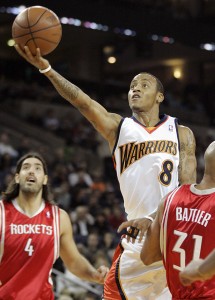It’s an interesting question. At first glance, it would appear so. The team’s starter at the position, Monta Ellis, ranked sixth in the NBA in scoring at 25.5 points per game. That’s an impressive stat. But there are many who consider it a vacant stat. You’ve heard the reasons: Ellis is inefficient, he’s a ballhog, he doesn’t make his teammates better, etc. Ellis is a talented player, no doubt. He is the captain and considered by most to be the best player on the Warriors’ roster. At one point during the season, he proclaimed himself to be a better player than LeBron James (follow this link and scroll near the bottom of the article).
But … if Ellis is such a great player, why does his team play so poorly? If he’s such a spectacular talent, why does the team perform better when he’s not playing? Take a look at the players in the NBA who averaged 25 points or more this season (there were seven): Kevin Durant, LeBron James, Carmelo Anthony, Kobe Bryant, Dwyane Wade, Monta Ellis, Dirk Nowitzki. Ellis is the only player on that list whose team failed to make the playoffs this season. Ellis’ team wasn’t even close.
Talented? Yes, Ellis is clearly a skilled player. He is also very fun to watch, which makes him a fan favorite. But does he make his team better? Does he make his teammates better? If you’re reviewing the 2009-10 season, the answer is no. Looking to the future, how much do you trust Ellis to improve? In 2010-11 and beyond, will Ellis make his team better? Will he make his teammates better? If you think he will, you’re probably very happy with the Warriors’ situation at shooting guard. If you think that kind of improvement is beyond him, then you’re likely hoping the Warriors trade Ellis this offseason.
Here’s a look at the shooting guards on the Warriors roster and some ideas about what to expect from them in the upcoming season:
Monta Ellis: The following stats look great for Ellis: 25.5 points, 5.3 assists, 2.23 steals, .753 FT percentage.
But then you see the stats that aren’t so great: 4.0 rebounds (you’d like more from your starting shooting guard, especially when he’s playing 41 minutes per game), .449 FG percentage (not good enough), .338 3-point percentage (it improved as the season wore on, but long-distance shooting is still not a strength for Ellis).
And … then you see the really bad stats: 3.8 turnovers (led the league), 22 shot attempts per game (led the league).
There’s a lot of good with Ellis, but there’s a lot of bad, too. Does the good outweigh the bad, or vice versa? It’s a valid question.
Ellis’ defense is a problem, especially since he is paired in the backcourt with Stephen Curry, which means the slight 6-foot-3 Ellis is required to guard shooting guards who are almost always taller, bigger and stronger than he is. Ellis has the speed and quickness to play a pesky brand of defense that has been effective in spurts. But most of the time, Ellis is a bad defensive player. It is frustrating to know that Ellis could be a good defender if he applied consistent effort. But for whatever reason, he doesn’t. It might be lack of focus, it might be lack of discipline, it might be fatigue (Ellis plays way too many minutes). If a Warriors coach were to cut Ellis’ minutes (to 35 or 36 per game) and demand defensive intensity, there’s a chance Ellis could capitalize on his ability and become a good defensive player.
The most damning part of Ellis’ game is his high volume of shots, which when combined with his subpar shooting percentage — .449 is acceptable for a shooting guard who takes only 5-10 shots per game, but not for a high-volume shooter like Ellis — makes him a very inefficient scorer. When Ellis is in the game, the Warriors’ offense suffers because he takes too many shots, spends too much time dribbling in isolation, and turns the ball over too much. It may have been because of injuries or fatigue (again, those 41 minutes per game were too many), but Ellis’ shooting numbers declined every month except one in 2009-10:
November: .478
December: .463
January: .434
February: .426
March: .437
April: .418
Even as his shooting percentages went down, Ellis’ volume of shot attempts stayed consistent. I was hoping when I crunched the numbers that Ellis’ shot attempts would have declined in the last couple months of the season. I hoped to see that he had ceded some control of the offense as Curry took ownership of the team. The numbers declined, but not enough. Ellis continued to shoot an irresponsible number of shots per game. Here’s a look at the numbers:
November (14 games): 20.8 shots
December (15 games): 22.6 shots
January (13 games): 23.9 shots
February (8 games): 21.1 shots
March (9 games): 21.1 shots
April (3 games): 22.3 shots
To be effective for the Warriors, Ellis needs to take a lesser role in the offense. He needs to take fewer and better shots. If Ellis averaged 16 shots per game and shot 48 percent, he would be a far more effective player. And he wouldn’t sacrifice that much scoring; in that scenario with Ellis’ 3-point and FT totals staying the same, Ellis would still average 21.1 points per game. Combine that shift in offensive philosophy with fewer minutes (34-36 minutes per game) and a consistent focus on defense, and Ellis would become the star he and many Warriors fans believe him to be. Can he make that change? I don’t know.
The future is cloudy with Ellis. Other than Stephen Curry, who is untouchable, Ellis has the highest trade value on the team. If the Warriors decide to trade him, he could help by bringing back a player who can help build the team into a contender. But, there’s always the chance that Ellis could figure all this stuff out after the Warriors trade him and haunt the franchise and its fans for years. Trading Ellis is a risk, so if the Warriors do it this summer, they need to make sure the trade brings back equal or superior value. You don’t trade Ellis to give him away. You trade Ellis to improve your team.
NOTE: I wrote so much about Ellis, I’m going to wrap up this blog entry at this point. Add your comments about Ellis to this entry and then check back in the next day or so for an entry on the other shooting guards on the Warriors’ roster (Reggie Williams and Anthony Morrow — though both could also be considered small forwards).


